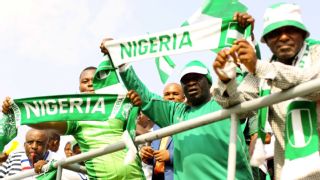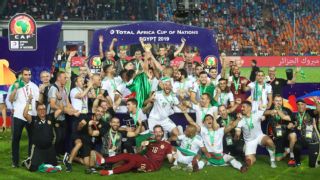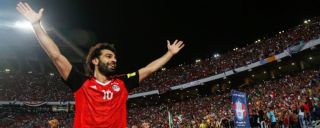|
The Africa Cup of Nations qualifying campaign has (almost) come to a conclusion, with only the controversial qualifier between Sierra Leone and Benin outstanding. All of the continent's biggest names have secured their tickets to the 2022 tournament in Cameroon -- with the exception of ousted South Africa -- but which of the continent's top sides can genuinely be aiming for glory next year? With just over nine months to go until the tournament, here are ESPN's far-too-early predictions of the top six contenders for the continent's grandest prize. Egypt The Pharaohs are still licking their wounds after their shock elimination by Bafana Bafana on home soil at the last edition, and the hangover from that exit resulted in a slow start to the qualifying campaign. While Mohamed Salah's supporting cast isn't perhaps as strong as it was four years ago -- although there is some excitement around the new faces -- the Liverpool superstar has shown evidence of a burgeoning understanding with Al-Ahly CAF Champions League final hero Afsha, and they certainly turned on the class against the Comoros in a 4-0 victory on Monday. If the camp is settled and united, then they could go the distance, although they will need to lean heavily on Salah, while coach Hossam El-Badry must still win over the supporter base and domestic media. Morocco The north Africans barely broke a sweat during qualification, and enjoyed the best defensive record of all 48 African teams in the qualifying group stage -- conceding just once in six matches. Morocco have been quite dramatically transformed since the departure of Herve Renard, whose well-oiled machine were unfortunate to miss out on the knockouts at the 2018 World Cup. Influential midfield duo Mbark Boussoufa and Karim El-Ahmadi have departed the scene, although their replacements -- Sofyan Amrabat and a remodelled Adel Taarabt -- could yet imitate their ability to ensure that Morocco retain control and the initiative in contests. Acrhaf Hakimi -- roaming down the right flank -- and in-form Youssef En-Nesyri should give them an immense threat, while in Chelsea's Hakim Ziyech, they boast one of Africa's finest creative minds... but as yet, the team hasn't clicked as hoped. Vahid Halilhodzic doesn't appear to have entirely settled into the role as Renard's successor -- not helped by COVID-19 -- and has expressed his desire for more unity within his side. "The team need needs time, talent is not enough," Halilhodzic told touchline journalists last week. "We need time and work, as there are many things to improve. We have a group with much talent, but with 85 percent new faces - with this you need time to build, it won't happen immediately. "Who told you that the team is exceptional? What has this team ever won?"  Nigeria Third-placed last time around, but have Nigeria truly kicked on since then? The likes of John Obi Mikel, Victor Moses, and Odion Ighalo have been moved out of the side, and while the new faces boast talent, there's a sense that Gernot Rohr is yet to truly get the best out of this squad. The pair of draws against Sierra Leone highlighted the Eagles' weaknesses both at the back -- in the 4-4 capitulation -- and going forward, as they lacked creativity in a 0-0 in Freetown. The squad appears balanced, although, as has been the case for a decade with the national side, can they get the right configuration in midfield? Three out of Wilfred Ndidi, Oghenekaro Etebo, Joe Aribo, and Alex Iwobi have the potential to be the finest in the tournament or -- as fans have seen in recent fixtures -- they can lack cohesion. Similarly, up top, the pairing of Kelechi Iheanacho and Victor Osimhen has the capacity to ignite, but they've only sparkled in flashes. Towering Plan B -- Paul Onuachu -- has the quality to be a difference-maker off the bench, while their wide players can stretch and torment opposition backlines. Rohr and his side must shake the perception, however, that they are less than the sum of their parts. Ivory Coast Dismal at the 2017 Afcon, disappointing during 2018 World Cup qualification, but only eliminated on penalties by Algeria in the 2019 quarterfinals, the Elephants appear to be on an upwards curve. Some faces from the 2015-winning squad -- Max Gradel, Eric Bailly, captain Serge Aurier -- still remain, but the squad has been bolstered dramatically by then. A central-defensive partnership of Bailly and Wolves' Willy Boly -- one of two high-profile new faces to commit to the Elephants in late 2020 -- has the potential to be the best defensive duo in Africa, while Franck Kessie, so influential at AC Milan this season, can run the show from midfield. In attack, the Elephants are spoiled for choice, with Sebastien Haller of Ajax likely to be supported by any of Wilfried Zaha, Gervinho, Nicolas Pepe, and even Manchester United new boy Amad Diallo. Algeria  The reigning champions, Algeria boast the kind of offensive quality -- and strength in depth in the final third -- that none of Africa's top sides can match. They were the continent's top scorers during qualifying - scoring a whopping 19 goals across six matches which, for context, was five more than any other team. Djamel Belmadi, who masterminded their title success in 2019, remains at the helm, and he has overseen continuous evolution since that triumph, with the likes of Oussama Darfalou, Ramiz Zerrouki, and Farid Boulaya coming into the squad. However, Algeria may be the team most disadvantaged by the tournament's move from 2021 to 2022, with more mileage added onto the legs of a team that is ageing dramatically. Riyad Mahrez, Sofiane Feghouli, Islam Slimani, Mehdi Tahrat, Djamel Benlamri, and HIlel Soudani are all over 30. Adlene Guedioura is still being called up at 35, while the likes of Aissa Mandi, and Baghdad Bounedjah will all be 30-plus by the time the tournament kicks off. Still, there's magic there, not least with Mahrez and Said Benrahma -- who missed the 2019 tournament with injury -- although a defence that conceded three away in Zambia, and two in Zimbabwe needs maintenance. Senegal Admittedly, Senegal ended qualification on a low note, having required a 96th-minte equaliser from Cheikhou Kouyate to salvage a draw at home against Eswatini, ranked 153rd in the world. However, this was a Teranga Lions starting XI without some of her key players -- Sadio Mane, Keita Balde and Idrissa Gueye included -- and it wasn't truly indicative of what the West Africans will bring to the table in Cameroon. The West Africans have re-established themselves as one of Africa's top sides in recent tournaments; they were only eliminated from the 2018 World Cups on yellow cards accrued and were defeated finalists at the 2019 Afcon. With Aliou Cisse overseeing a steady ship, they have consistency in selection and, critically, they have different ways of beating teams. Mane, of course, is the star man, but the likes of Mbaye Diagne Krepin Diatta, Boulaye Dia and new arrival Abdallah Sima represent different ways of hurting opponents. Could the lack of a central creator -- vital when trying to break down massed defences -- count against them? Certainly, scoring just twice in their last three games, against Guinea-Bissau (twice) and Eswatini, is a problem that needs to be solved.
|

